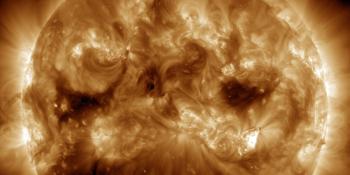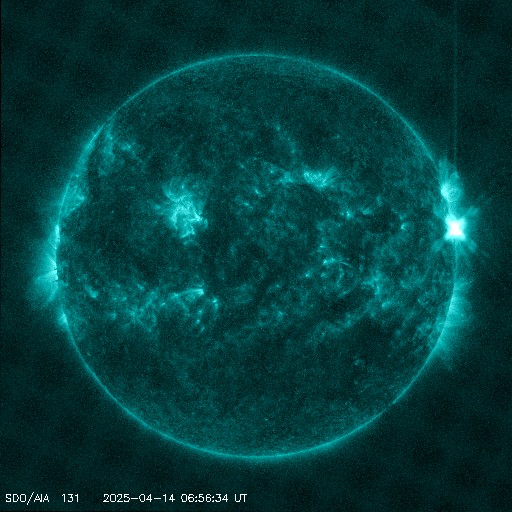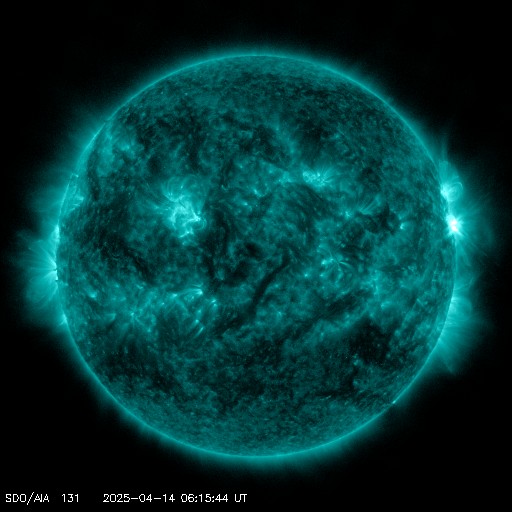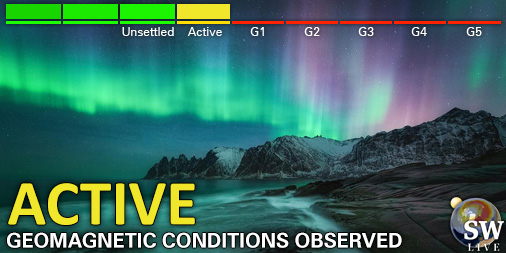Viewing archive of Monday, 7 May 2018
Daily bulletin on solar and geomagnetic activity from the SIDC
Issued: 2018 May 07 1230 UTC
SIDC Forecast
Solar flares
Quiet conditions (<50% probability of C-class flares)
Geomagnetism
Active conditions expected (A>=20 or K=4)
Solar protons
Quiet
| 10cm flux | Ap | |
|---|---|---|
| 07 May 2018 | 068 | 017 |
| 08 May 2018 | 069 | 015 |
| 09 May 2018 | 069 | 008 |
Bulletin
Solar activity was at very low levels. Active region NOAA 2708 is currently the only sunspot group visible on the solar disk. The source region of the 3 May CME (farside) is about to rotate over the east limb. No earth-directed coronal mass ejections (CMEs) were observed in available coronagraphic imagery. The greater than 10 MeV proton flux was at nominal levels.
Solar activity is expected to be at very low levels, with a slight chance on a C-class flare.
Earth is under the influence of the high speed stream (HSS) from an elongated negative polarity equatorial coronal hole (CH). Solar wind speed mostly undulated between 610 and 710 km/s (DSCOVR). Bz varied between -6 and +6 nT. The interplanetary magnetic field was mostly directed towards the Sun, with some "away" excursions from 07UT onwards. Mostly unsettled to active geomagnetic conditions were observed, with an isolated minor storming episode in the Kp index during the 21-24UT interval.
Quiet to active geomagnetic conditions are expected, with a chance on an isolated minor storming episode.
Today's estimated international sunspot number (ISN): 015, based on 23 stations.Solar indices for 06 May 2018
| Wolf number Catania | /// |
| 10cm solar flux | 067 |
| AK Chambon La Forêt | 034 |
| AK Wingst | 026 |
| Estimated Ap | 029 |
| Estimated international sunspot number | 015 - Based on 29 stations |
Noticeable events summary
| Day | Begin | Max | End | Loc | Strength | OP | 10cm | Catania/NOAA | Radio burst types | |
|---|---|---|---|---|---|---|---|---|---|---|
| None | ||||||||||
Provided by the Solar Influences Data analysis Center© - SIDC - Processed by SpaceWeatherLive
All times in UTC
Current data suggests there is a slight possibility for aurora to appear at the following high latitude regions in the near future
Edmonton, AB, Gillam, MB, Saskatoon, SK, Whitehorse, YT, Yellowknife, NTJuneau, AK
Latest news
Latest forum messages
Support SpaceWeatherLive.com!
A lot of people come to SpaceWeatherLive to follow the Sun's activity or if there is aurora to be seen, but with more traffic comes higher server costs. Consider a donation if you enjoy SpaceWeatherLive so we can keep the website online!

Latest alerts
07:09 UTC - Solar flare
Moderate M4.28 flare from sunspot region 4055
06:48 UTC - Radio Blackout
Minor R1 radio blackout in progress (≥M1 - current: M1.53)
06:24 UTC - Solar flare
Moderate M1.49 flare from sunspot region 4055
06:06 UTC - Radio Blackout
Minor R1 radio blackout in progress (≥M1 - current: M1.16)
04:45 UTC - Geomagnetic activity
Active geomagnetic conditions (Kp4) Threshold Reached: 04:29 UTC
Space weather facts
| Last X-flare | 2025/03/28 | X1.1 |
| Last M-flare | 2025/04/13 | M1.6 |
| Last geomagnetic storm | 2025/04/06 | Kp5 (G1) |
| Spotless days | |
|---|---|
| Last spotless day | 2022/06/08 |
| Monthly mean Sunspot Number | |
|---|---|
| March 2025 | 134.2 -20.4 |
| April 2025 | 132.1 -2.1 |
| Last 30 days | 132.4 -10.7 |





